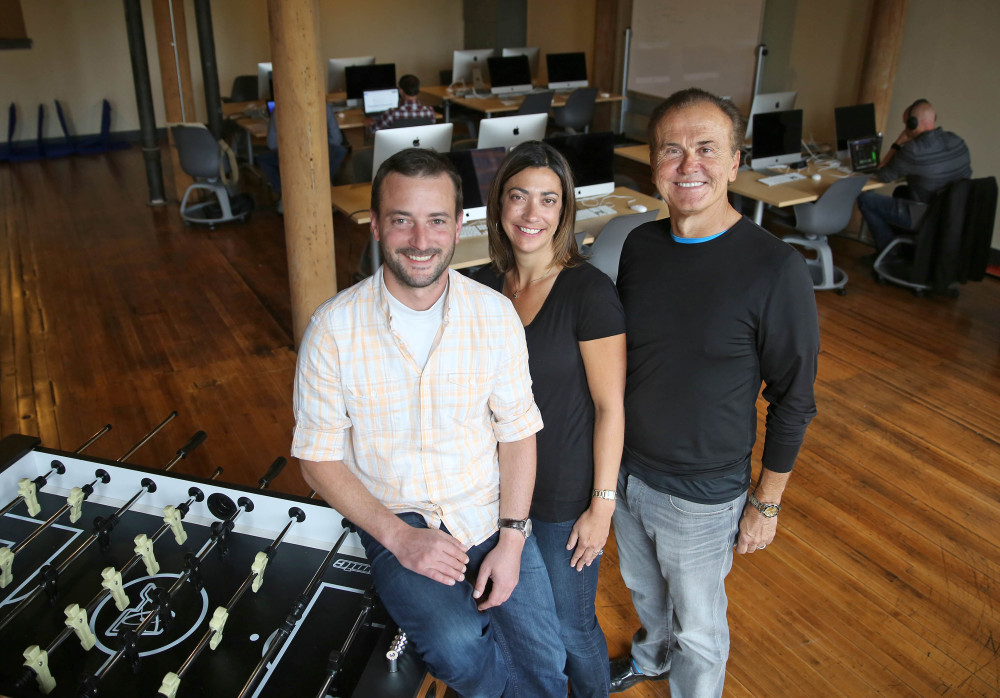By Kathleen Gallagher
Milwaukee Journal Sentinel.
MILWAUKEE
With eight employer requests for every student currently accepted into its computer coding classes, Milwaukee-based DevCodeCamp is expanding the amount of space it leases and the number of students it will train. It’s all part of an educational coding surge that is happening in many other cities, as well.
This school, the first of its sort in Wisconsin, is taking an additional 2,500 square feet in Ward4 Milwaukee, a co-working space just south of downtown Milwaukee, said founder Jim Brent. The expansion will nearly double the space it occupies.
DevCodeCamp, which since June has been running intensive computer coding boot camps here that last for months, rather than years, is attracting pilots, teachers, sales reps and others from a range of occupations, Brent said. All of them are seeking the same thing: good-paying technology jobs with employers who are begging for this type of talent.
“They’re on the verge of major growth right now, and I think they can make a material impact on employment in Milwaukee,” said Steve Mech, a co-founder of Ward4, which takes applications for individual and corporate memberships. “They just have to get the students in the queue.”
As tablets, smartphones and other Internet-connected devices have proliferated, the number of coding boot camps in the world has exploded. There are 367 coding schools in the database compiled by Course Report, a New York company that operates a boot camp directory. The average program lasts 10 weeks and the average full-time program costs $9,900, but can cost as much as $20,000, Course Report says.
DevCodeCamp’s classes cost $14,987.
Graduates of coding boot camps reported a 75 percent job placement rate and an average salary of nearly $76,000, according to Course Report’s 2014 survey.
“It’s the next big thing,” Brent said.
Brent, who started at age 19 in computer sales and marketing and worked for the likes of Amdahl, Data General and Digital Equipment, has operated Brensten Education and its predecessor schools since 1994. But Brensten is focused on training students for computer support and network administration jobs. Coding is the skill that employers ranging from big corporations to small start-ups are demanding.
So Brent started DevCodeCamp as a separate operation that is licensed by the state, but not accredited. By choosing not to seek accreditation, the school can modify its curriculum quickly to keep up with a rapidly-evolving industry, he said. DevCodeCamp seeks students who can think logically and have the ability to communicate and collaborate, a key skill employers are looking for, Brent said.
A common misconception about becoming a software engineer is that it takes a math whiz who majored in rocket science. But writing code is really about creating a story and using variables, strings arrays and other coding techniques to tell it, Brent said.
“We find good people, then we teach them to code,” he said. “This is about getting your 750 hours of coding experience in 14 weeks. We’re almost equivalent to a four-year computer science degree in terms of the amount of computer training.”
Consequently, DevCodeCamp students don’t listen to lectures; they do hands-on activities and are required to develop projects individually, in pairs and in small teams of three to five people, Brent said.
When Joe Laurendi, who has a master’s degree in computer science from the Massachusetts Institute of Technology, was invited to a project demonstration by three DevCodeCamp students, he wasn’t expecting much. With just five days to create a website for alumni of their program, Laurendi figured the three students’ work would contain half-coded ideas and frankly, some sloppiness.
But the students, who were nearing the end of a 14-week computer coding boot camp, surprised him.
“I was more impressed than I thought I would be. It looked like a site you could go online and use,” said Laurendi, co-founder and chief technology officer at Bright Cellars Inc., a Milwaukee-based online wine retailer.
Rachel Buchholtz, who manages talent recruiting at Wauwatosa, Wis., insurance software provider Zywave Inc., had a similar reaction, and her company has already hired two DevCodeCamp graduates, she said.
“Zywave prides itself on being a dynamic and innovative thought leader within our marketplace, and coming across another organization that’s disrupting what’s typical in education is very intriguing,” Buchholtz said. “Their students are likely to do things differently and creatively.”
DevCodeCamp has graduated a total of 11 students from pilot classes it ran this summer, Brent said. It has nearly 300 employer requests for candidates for junior software engineer, junior web developer and software quality testing positions, he said.
So far, there are 37 students enrolled for fall classes. With two full-time and two part-time classes planned in Milwaukee this fall, each class will have 20 students, the program has capacity for 43 more students, Brent said.
Going forward, there is potential for much more growth, he estimated. DevCodeCamp may add another Milwaukee class that would start in November, and is considering expanding to other cities, such as Madison, Chicago or Minneapolis, he said.














































































































































































































































































































































































